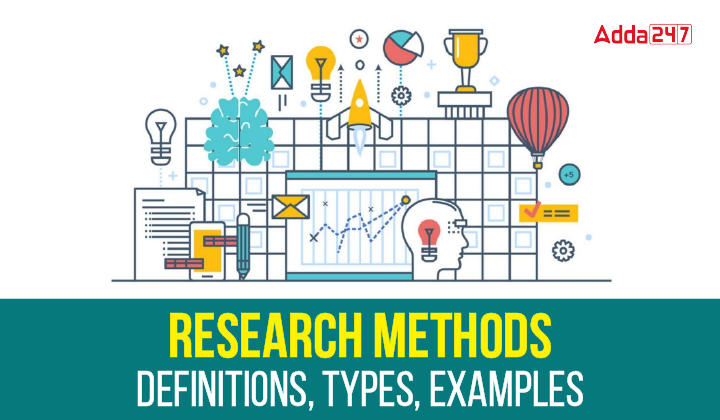Table of Contents
Research is a methodical and rational exploration aimed at uncovering valuable and untapped information pertaining to a specific subject. It involves seeking knowledge, delving into uncharted territories to reveal truths that were previously undiscovered. By knowledge, we refer to information about various matters. Moreover, research has the potential to bring about fresh insights and enrich the existing pool of knowledge.
UGC NET Study Notes for Paper 1
What are Research Methods?
Research methods are the numerous procedures, schemes and algorithms used in research. All the ways and means used by a researcher during a research study are called research methods. These include theoretical procedures, experimental studies, numerical schemes, statistical procedures, etc.
Methods of research help us to collect samples, data and find an answer to a problem. Scientific research methods are based on scientifically collected facts, measurements and observations. They accept only those explanations which can be verified by experiments.
Types of Research Methods
Methods of research help us to collect samples, data and find an answer to a problem. Scientific research methods are based on scientifically collected facts, measurements and observations. These are
Experimental Research Methods
The experimental method is a systematic and scientific way to research in which the researcher manipulates one or more variables, in contrast to the control variable and measures the change in other variables. Features of experimental research are:
- It is designed to establish causal relationships.
- It is systematic and a scientific method of conducting research.
- These are used to accept or reject a Hypothesis.
Descriptive Research Methods
Descriptive research methods are aimed to describe a population, situation or phenomenon. It includes surveys and fact-finding inquiries of research. Its aim is to describe the state of affairs which were prevailing at the time of the study. It can answer what, where, when and how questions, but not why questions.
The following are the main features of descriptive research methods:
- Here, the researcher does not have control over the variables.
- Obtain a comprehensive understanding of the research question
- Involves gathering information on variables at a given point in time
Different means of descriptive research:
- Surveys: Survey research permits researchers to gather large volumes of data that can be analyzed for frequencies, averages and patterns.
- Observations: Observations entitle researchers to collect data on behaviours and phenomena without having to rely on the honesty and precision of respondents.
- Case studies: A case study can be used to illustrate the characteristics of a specific subject or research problem.
Historical Research Methods
Historical research methods focus on studying, understanding and interpreting past events. Its objective is to reach insights or conclusions about past occurrences. It not only includes compiling and presenting data but also the interpretation associated with it. Major features of historical research are:
- Often entirely archival materials, written records and artefacts
- These are analytical as it uses logical induction
- These are flowing, sophisticated reports on past events
- These are qualitative nature
Methods of Historical Research
- Archival data: Archival data, or primary sources, are typically the resources that researchers rely most heavily on. It includes official documents and other items that would be found in archives, museums, etc.
- External Sources: Secondary sources are the works of other historians who have written history.
- Running Records: Running records are “documentaries maintained by private or non-profit organizations.”
- Recollections: Recollections include sources such as autobiographies, memoirs or diaries.
Quantitative Research Methods
Quantitative research methods are used to gather and analyse numerical data. These can be utilised to find causal relationships on the basis of certain patterns and averages. In the end, this assists the researcher to make predictions and make generalisations. Below are the major features of quantitative research methods:
- Quantitative research methods are widely used in natural and social sciences.
- These are systematic investigation methods
- Data obtained is analysed by employing mathematical, statistical and computational tools to obtain results.
- Well-Structured Data Representation
- Normal Population Distribution
Methods of quantitative research are:
- Experiment: Experimentation refers to the usage of scientific methods for establishing the cause-effect relation between the dependent and independent variables of research. Here, the researcher Control or manipulate an independent variable to gauge its effect on a dependent variable.
- Survey: These are used to widely gather and describe the characteristics of a target population. Here, the researcher asks questions to the group of people in person, over the phone or online or by using questionnaires. Surveys are of two types:
Qualitative Research Methods
Qualitative research methods are developed in a manner that allows to reveal the behaviour and perception of a target audience concerning a particular topic. These are also known as market research methods that focus on obtaining data through open-ended and conversational communication. Some features of qualitative research methods are:
- They originate from social and behavioural sciences
- It deals with “what” people think and “why” they think so.
- The results derived from these methods are more descriptive
Different qualitative research methods include:
- One-on-one interview: It is a personal interview that is carried out with one respondent at a time. It is a conversational method used to get details from the respondent.
- Focus groups: A focus group technique includes a limited number of respondents (6-10) from within your targeted population.
- Ethnographic research method: It is an in-depth observational method used to study people in their natural and regular environment.
- Case study method: This method is used for explaining an event related to an organization or an entity.
In a nutshell, research methods can be categorised into different categories depending on the characteristics of the research data and the objective for which they are being used. The researcher needs to carefully understand the requirements of the research design to employ correct research methods.
Download Research Methods Definitions, Types, Examples
| Read more UGC NET Notes | |
| UGC NET Study Notes for Paper 1 | UGC NET Commerce Notes PDF |




 UGC NET Commerce Syllabus 2025 PDF Downl...
UGC NET Commerce Syllabus 2025 PDF Downl...
 UGC NET Philosophy Syllabus 2025 PDF Dow...
UGC NET Philosophy Syllabus 2025 PDF Dow...
 PMMMNMTT for NEP 2020, Check details Her...
PMMMNMTT for NEP 2020, Check details Her...














